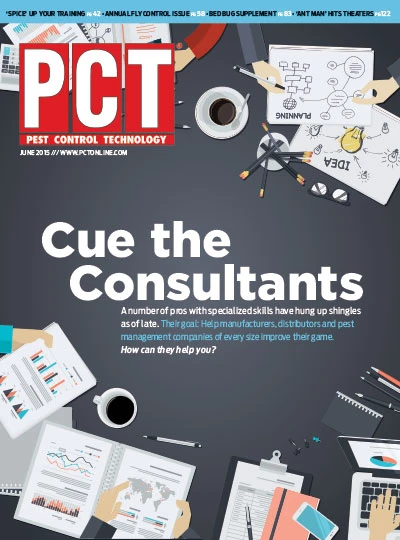As I write this column, I am a bit groggy. I stayed up too late the previous night watching my hometown Cleveland Cavaliers beat the Golden State Warriors in an NBA Finals game. I’m engrossed in this series and I’m hopeful that the Cavs can break our city’s 51-year championship drought. (At press time, the Cavs are up 2-1 in the best of seven series — fingers are crossed!)
I wish I could say that this incident was a rare occurrence, but the truth is I’m not a big sleeper — never have been. I sleep 5 to 6 hours per night and even on the weekends I usually am the first one out of bed at our house. I read somewhere that former President Bill Clinton only sleeps 5 hours a night. If that amount of sleep is good enough for Bill, it is good enough for me. But perhaps it’s time to change that school of thought. As part of PCT’s recent “Million Dollar Club” virtual event, speaker Michael Botha, president of Pearl City, Hawaii-based Sandwich Isle Pest Solutions, gave a presentation titled “Impossible is Nothing.” During his presentation Botha touched on the importance of sleep, which he compared to a credit card. “You can keep charging and charging on a credit card, but eventually you are going to have to pay it back with interest,” he said. “Same thing with sleep. You can [function] with less and less sleep, but eventually it is going to catch up with you, and you are going to get sick. You are going to have to repay that debt with interest.”
It was an interesting analogy and one that made me rethink my attitude towards sleep. Since I work a desk job, my occupational hazards are minimal, but I certainly understand why pest management professionals need to be well rested. Let’s start with driving. The National Highway Traffic Safety Administration (NHTSA) estimates conservatively that each year drowsy driving is responsible for at least 100,000 automobile crashes, 71,000 injuries, and 1,550 fatalities. As pest control is a route-based profession, PMPs spend significantly more time on the road than the average worker; thus, they are more exposed to driving dangers. In fact, according to an April 2015 PCT Reader Poll, more than 81 percent of PCT’s readers have been involved in an accident while driving their service vehicles. Then there are jobsite hazards such as maneuvering in crawlspaces, climbing up ladders, using power tools, etc. According to the website WebMd, excessive sleepiness contributes to a greater than two-fold higher risk of sustaining an occupational injury.*
And new research suggests that sleep deprivation may have serious long-term effects. The Nedergaard Lab at the University of Rochester Medical Center recently published a series of studies in the journal Science that sheds new light on the importance of sleep. As reported in a January 2014 New York Times article the Nedergaard lab’s research shows that sleep may play a crucial role in our brain’s physiological maintenance.+ As your body sleeps, the article states, your brain is quite actively playing the part of mental janitor: It’s clearing out all of the junk that has accumulated as a result of your daily thinking. “When our sleep is disturbed, whatever the cause, our cleaning system breaks down,” the article noted. “At the University of Pennsylvania’s Center for Sleep and Circadian Neurobiology, Sigrid Veasey has been focusing on precisely how restless nights disturb the brain’s normal metabolism. What happens to our cognitive function when the trash piles up? At the extreme end, the result could be the acceleration of neurodegenerative diseases like Alzheimer’s and Parkinson’s.” Importantly, the article noted that additional research is needed to make those connections, but it is interesting food for thought.
What doesn’t require additional research is sleep deprivation’s short-term effects. Pull an all-nighter or suffer through a restless, sleepless night and you’ll discover that lack of sleep impedes your ability to concentrate, to pay attention to our environment and to analyze information creatively; in other words, impeding on the very traits essential for PMPs to perform their jobs effectively on a daily basis.
The author is managing editor and Internet editor of PCT.
References:
*Sleep Habits: More Important Than You Think, WebMd. Retrieved from www.webmd.com
+Konnikova, Maria (2014, January 11). Goodnight. Sleep Clean. The New York Times. Retrieved from www.nytimes.com
WANT MORE?
Enter your email to receive our newsletters.

Explore the June 2015 Issue
Check out more from this issue and find your next story to read.
Latest from Pest Control Technology
- Birds In Buildings
- Third Hantavirus-Related Death Confirmed in California County
- Jonathan Richardson Shares Research Findings on Rodents and Zoonotic Diseases
- PPMA Emphasizes PMPs' Role in Tick Awareness Week
- PestSure Highlights Top Auto Crash Causes in National Distracted Driving Awareness Month
- Envu Introduces Botanical-Based Insecticide to Treat Mosquitoes
- Massey Services' Ed Dougherty Announces Retirement
- Cook's Pest Control Brandon Martin Uses First Responder Training to Save Customer's Life





